Author: Sarai Bronfeld
Compiled by: MetaverseHub
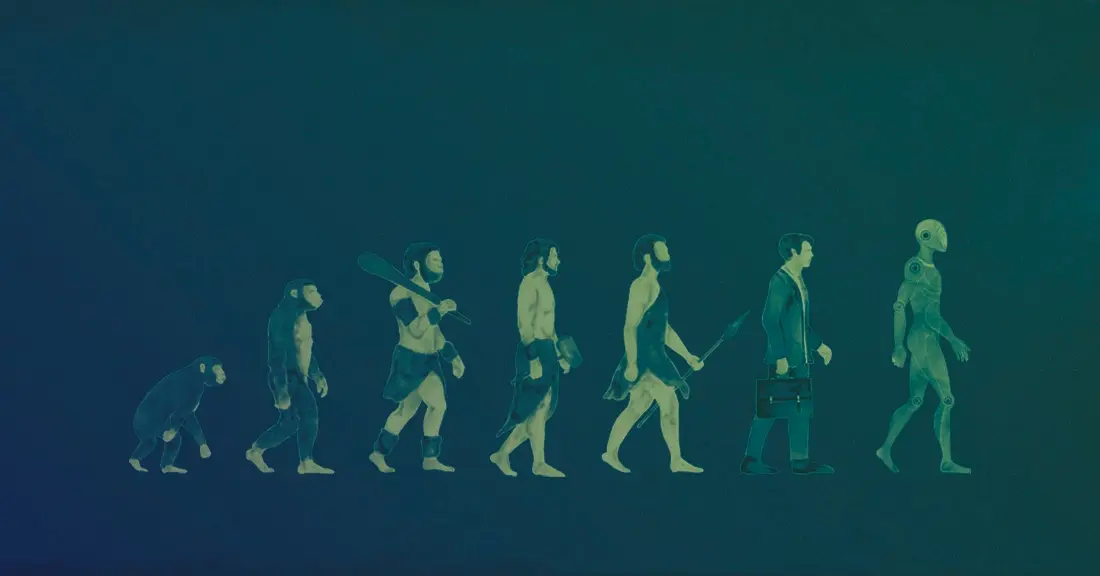
The development of AI agents will fundamentally change the way people work and the face of startups. In the past year, the number of startups based on AI agents has skyrocketed from single digits to dozens per month.
In Israel, the number of startups establishing AI agents has surged, focusing on enabling others to integrate and customize these agents to meet different scenarios.
Many of these companies are leveraging Israel's strengths in cybersecurity, data science, and enterprise software to build AI agents that can solve vertical industry problems, such as medical diagnosis and predictive security.
At the same time, there are also horizontal applications such as workflow automation and personalized customer engagement.
As people begin to examine more of these AI agent-driven startups, they will notice that they are following certain common patterns.
For example, startups initially assisted by general AI are transforming into a complete "AI organization".
With each major advancement in the AI agent field, we are getting closer to the trend that was predicted a few years ago: more and more companies relying on AI automation will emerge, with humans only responsible for key strategic decisions.
This momentum has been building for years, but now it feels like a turning point.
OpenAI CEO Altman predicts that this year will be the year when AI agents truly join the workforce. By 2027, at least half of companies will have launched some form of AI agent.
And this is just the beginning.
In the near future, people may see the entire economy composed of these AI-first organizations. And to build a truly enduring company, one must see this development.
Perhaps later, companies will employ AI agents, with humans working alongside or even competing with them.
What's next?
Here are five potential evolutionary stages of AI agents:
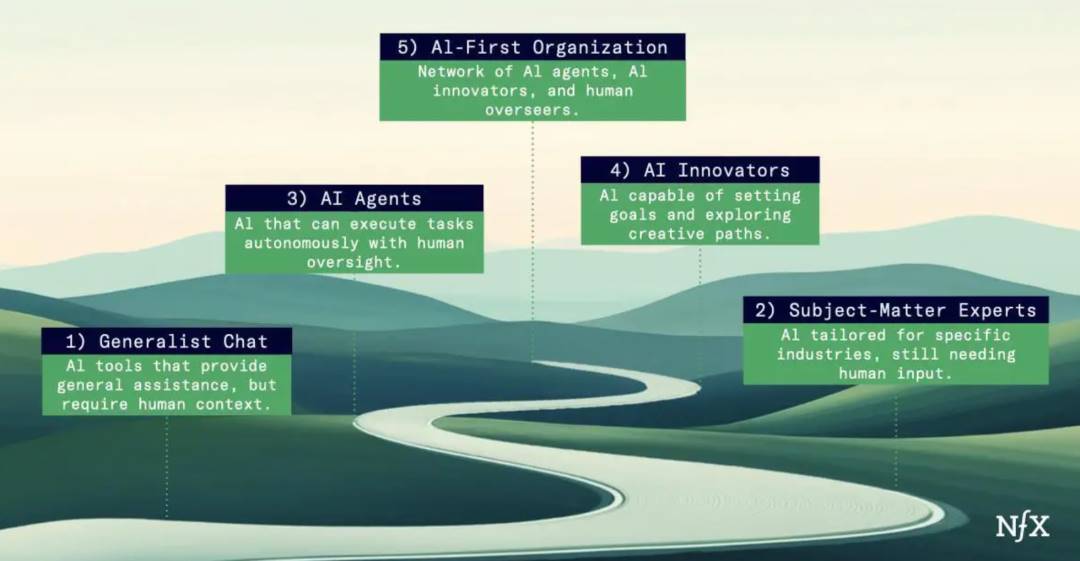
01. General Chat
The first wave of AI collaborators are base models (general LLMs like ChatGPT or Claude). They break through the user experience, helping people understand the broad capabilities of AI.
However, AI is just a tool, and humans still lead in imbuing AI with context, rationality, and empathy.
As early adopters say, these general tools are "masters without a master". This has shifted the landscape of AI startups to the first stage of evolution.
02. Domain Experts
General AI can read, write, and execute tasks with the right guidance. But general AI tools still perform poorly in highly specific industry environments.
Soon after the rise of general AI, we started seeing the emergence of true AI "experts" in specific domains.
AI seems to be able to solve problems without much human prompting, with chat still being the primary interface, but many companies have built additional industry-specific functionality on top of the chat capabilities.
Legal is one example, with companies like EvenUp and Darrow demonstrating the power of AI trained on specific legal data corpora. These AIs can understand the nuances of legal language and generate professional-level legal materials.
03. AI Agents (Current Stage)
There are still many excellent companies operating at the AI domain expert level.
But over the past year or so, there has been a noticeable shift from a value proposition based on chat to one based on action.
General AI tools and domain experts are true "co-pilots", able to create new connections, generate content, or provide new materials. But humans still need to take action to make these tools truly effective.
Starting in April 2023, we've begun to see AI able to execute some more advanced tasks.
The most prominent AI agent cases are in the realm of code generation, such as OpenAI's code explainer or Cognition's AI programmer Devin.
But the concept has gone far beyond just code generation and into more complete "job descriptions".
There are now more and more AI agents dedicated to specific tasks. The packaging and combination of these tasks have tremendous potential to be transformed into real services.
For example, Enso, backed by NFX, is pioneering an AI agent marketplace for small and medium-sized businesses.
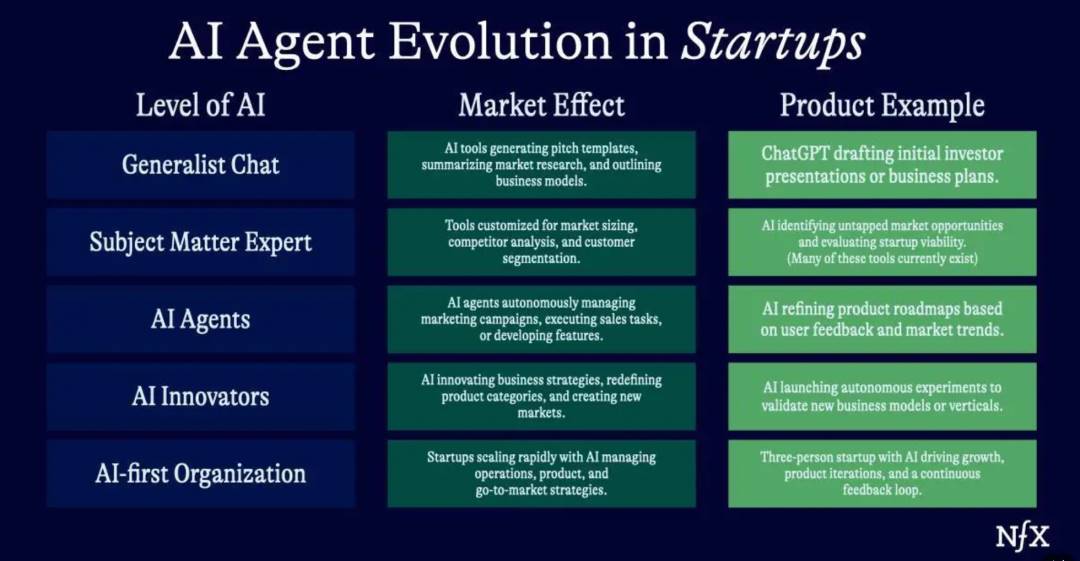
Once people continue to refine the ability of AI to complete tasks and take action without heavy human supervision, there will be no going back.
04. AI Agent Innovation
Once AI agents can consistently execute tasks, we will soon see agents with innovative capabilities. If we allow AI to generate and explore new knowledge directions, its value will be elevated to a whole new level.
We can look at this through the lens of how the human brain solves problems and exercises creativity.
We have task-oriented "if-then" mental presets that help us execute tasks and solve problems.
But we also have an active subconscious, a mode of thinking that kicks in when you're not focused on problem-solving, like when you're showering or taking a walk.
Have you ever experienced struggling to write or solve a problem, only to easily solve it after taking a break?
That's the result of your subconscious freely exploring new creative approaches. Most new, creative ideas emerge in this state.
AI innovation agents will be able to engage in this subconscious exploration. They won't be constrained by the "if-then" logic statements that can lead to narrow thinking.
Imagine if on Monday you asked a group of AI agents to develop a software feature, and by Tuesday, they had already improved on your initial requirement based on trial-and-error experience and market analysis, developing an even better feature.
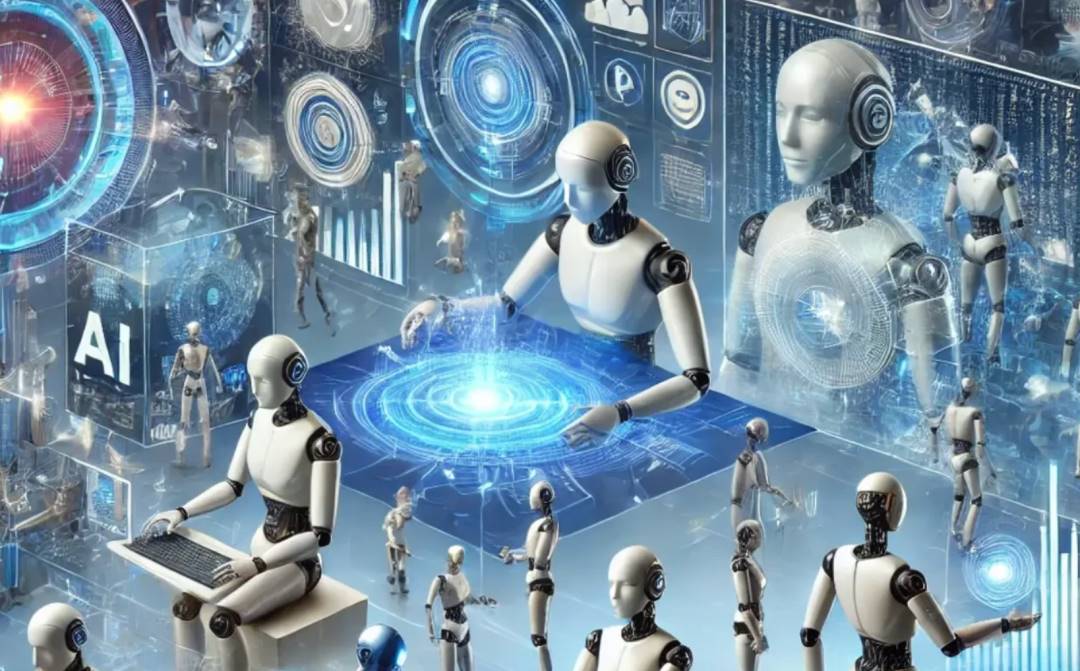
When the goal itself is more abstract (increase sales, improve software performance, make users love my app), planning the goal and charting the path will be key to the next stage of AI agent development.
This is also a critical factor in allowing AI agents to truly become a mature workforce.
Pure automation without critical thinking is the low-hanging fruit in the economy. But it cannot solve the biggest, most valuable problems - creativity can.
The key unlocking factor is trust. People need to have confidence in AI agents to make strategic decisions, not just task-oriented ones.
Some of this trust must be built through technology. People need two things: explainability and infrastructure. These two things may even become industries in themselves.
For example, Maisa, backed by NFX, is refining the "proof of work" for AI agents, a key factor in establishing trust in the entire agent ecosystem.
Another NFX-invested company, Emcie, is developing the infrastructure needed to create highly specialized AI agents for individuals and businesses.
This trust will also develop culturally. The more people see AI making intelligent decisions and creating better outcomes, the faster the future will come.
Early adopters will be the key. Small and medium-sized businesses or companies that simply cannot afford to hire human labor to meet their needs will take the first steps, and the rest of the ecosystem will watch and follow.
It will touch all industries. For example, in the education sector:
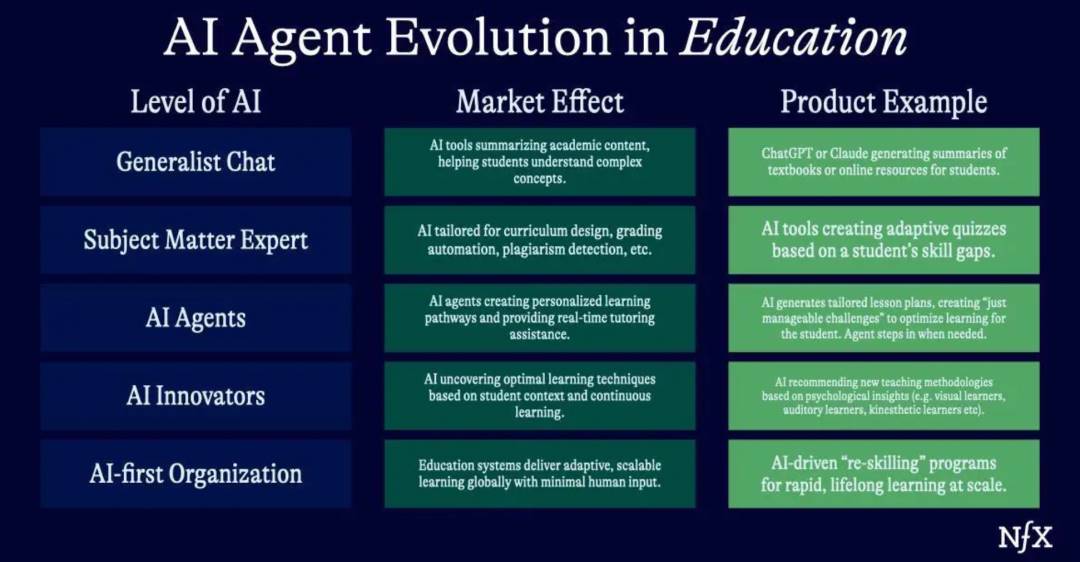
05. AI-Centric Organizations
With the advent of AI agent workers, AI innovation, and trust and explainability systems in place, we will ultimately see the rise of true AI-powered organizations.
These organizations are a collection of AI agents and AI innovators capable of undertaking a wide range of actions.
This is the kind of AI that we often hear about in science fiction.
In the worst-case scenario, you can read about this kind of AI in Daniel Suarez's "Daemon," or in Naomi Kritzer's "Improving Life Through Algorithms."
These agents can make decisions in complex environments where there are many potential target values worth pursuing.
The difference here is that the AI itself will be able to self-select which targets are optimal and design the paths to achieve those targets.
The AI will take most of the actions, and you will work alongside the AI, reviewing and auditing the paths it takes.
One can imagine a self-managing supply chain that oversees the entire process from production to delivery, and an automated financial trading company composed of many AI agent components.
People don't expect all of this to happen immediately; it will happen in stages.
As trust and technology evolve, AI will begin to take on increasingly larger tasks. In fact, we are still in the technological window of AI agent systems.
Those who truly understand this are still the builders and hobbyists who are working hard.
But soon, an AI-led organization will emerge, and people will experience a "ChatGPT" moment. How many people truly understood the capabilities of AI before ChatGPT appeared?
If you know where people are headed, you'll be ahead of the curve.
In Israel, the AI agent market is booming, with startups fully leveraging the local expertise in machine learning, cybersecurity, and automation.
We're seeing more and more companies building foundational agent platforms for others to customize, like Enso.
These startups have already begun tackling vertical challenges in fintech, logistics, and healthcare, positioning themselves as key contributors to a rapidly evolving AI ecosystem.
The AI agents are coming, the AI innovators are coming, the AI organizations are coming.
So, ask yourself, what is holding these things back from entering your domain? How can you remove the barriers? Or, once they are removed, how can you become a primary beneficiary?
Not every company should focus on building AI agent infrastructure.
But you can understand how the overall economic benefits in your domain will transform when these new labor pools are unleashed.
You can also consider the psychological impact on your team - what will it be like to manage only AI employees? Or, conversely, when humans are managed by AI?
At NFX, our job is to study how transformative technologies play out. These shifts are timed, and as technology changes, certain skills will become more or less important.
We also need to address the psychological shifts and the new opportunities that arise from them.
AI agents are in the most exciting new birth stage, and this is the moment when great companies are born.







